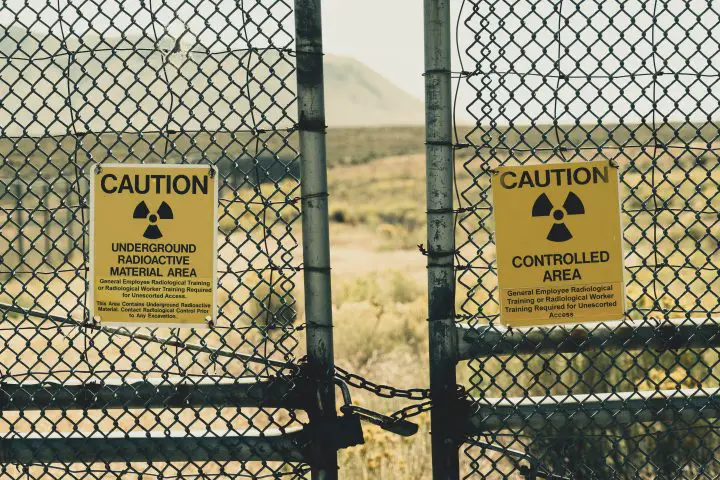Are you starting to get worried about the state of the planet? Want to know just how dangerous your precious vinyl is for the health of the world as we know it? Are vinyl records toxic? Why, indeed, are they still made this way?
All this and more today as we explore in depth the various chemicals and processes involved in the manufacture of vinyl records and what we can do to make these age-old processes a little better for the environment at large.

Why Are Vinyl Records Toxic?
So, to cut the inevitable crap, vinyl records are, in fact, toxic to the environment, as we have already discussed elsewhere when asking whether vinyl records can be recycled.
Briefly touching upon it again, though, for those not in the know, vinyl records are made of polyvinyl chloride (the vinyl chloride from which vinyl gets its name). This chemical is commonly referred to as PVC, something which you might be more likely to have heard of or seen on labels around the house – heck, they even make flooring from it.
Partially derived from the fossil fuel process, a vinyl record made from PVC is thus full of chemical additives that are dangerous to humans and the wider ecosystem in which they are created and subsequently reside.
Thankfully, the highest exposure risk to these raw chemicals is in the manufacturing process, so the average listener won’t get to learn how toxic vinyl records can truly be. This is, however, not entirely true, for vinyl records give off small amounts of toxic gases when they are played, though these are not nearly equal to the sheer amount of damage done to the environment by their manufacture.
Truly green vinyl records will therefore seek to eschew using any of the following chemicals:
- Vinyl Chloride – the primary component of PVC, which is extremely dangerous when inhaled, for it is considered a carcinogen.
- Ethylene Dichloride – a liquid used in the process of making vinyl chloride which can cause headaches, fatigue, and confusion.
- Mercury – a neurotoxin also used in the manufacture of vinyl chloride.
- Polychlorinated Biphenyls (PCBs) – liquid and wax chemicals banned in US manufacturing but still used globally. Since the vinyl revival, there has been a high demand for vinyl records, meaning that most manufacturing is done overseas in countries with overall less stringent manufacturing policies like this.
Are Vinyl Records Harmful to the Environment?
The short answer? God yes.
Due to the various chemicals used in the manufacture of traditional vinyl records, the finished polyvinyl chloride product is a non-recyclable material. This means that, depending on the various thickness and quality of the manufacturing process, it could take upwards of hundreds of years for the product to fully decompose.
But, you might ask, what about recycling vinyl records? Are there no dedicated facilities for the recycling of vinyl records and polyvinyl chloride into something else? To which we would answer, yes there are, but they are so few and so specialized that it would be relatively rare to find one near your area anytime soon.
Burning PVC releases dioxins and furans – nasty chemical byproducts of the various ingredients of vinyl records that, if inhaled, could result in the loss of liver function and even cancer. And this is to say nothing of the various detrimental effects such chemicals could have on the ecosystem around the recycling facility.
Thus, records cannot be disposed of or eradicated via incineration. The only other alternative seems to be leaving the unwanted records to rot in landfills for centuries, though this would come with its own set of treacheries, wherein the byproducts of the decomposition process would come to wreak havoc and other toxic chemicals into the ground and air.
The current vinyl revival, which came about in the mid-2000s, came as a shock to just about everyone at the time, with a boom in vinyl sales near-unprecedented. Unable to prepare, manufacturers sourced materials irresponsibly and manufactured the records inexpensively overseas. Thus, this resurgence in demand for vinyl records has heavily contributed to the various environmental pollution on this side of the 21 century.
Improvements to the Process
Vinyl record sales before the revival barely brought in a revenue of $2 million. Nowadays, these same vinyl records are bringing over $1 billion annually. Thankfully, this rampant increase in demand has been met with the desire for changing the manufacturing process, with several major manufacturers working on the creation of vinyl records from non-toxic materials.
The idea is to streamline the manufacturing process to use less energy (reducing the use of fossil fuels and water in the process) as well as produce records that are made from materials other than PVC that are recyclable.
Green Vinyl Records
There is one such manufacturer – the Dutch conglomerate Green Vinyl Records – who was one of the first vinyl record manufacturers to bring to the market an environmentally-friendly record. Their niche is that they use a process called injection molding to create their records, a process which itself used 60 to 70% less energy in the manufacturing process than that of traditional vinyl records.
Some audiophiles might poo-poo the sound quality, though this really is one for the minutiae of hearing, for it will be a barely audible difference to most. Is this also not a necessary loss to take when the environment is in such dire jeopardy?
Evolution Music
Another similarly inclined manufacturer, Evolution Music is actually the only manufacturer to have created bioplastic vinyl records, a variety of plastic made from plants and starches instead of fossil fuels.
This, therefore, makes their product one of, if not the most, environmentally-friendly records available on the market today. Though they are only just starting out, you would do your best to expect big things from them in the future, possibly even becoming the new standard for vinyl manufacture.
The idea is that, once it is in full swing, the production process will be as efficient as traditional vinyl record manufacture, with a look, sound, and cost on part with standard vinyl records today.
Final Tones
So, there you have it! Hopefully, you are now feeling ready and able to go out into the world and let everybody know just how much you know about what is in the know.
FAQs Are Vinyl Records Toxic?
Are vinyl records cancerous?
Technically, yes, though it is much more in the manufacturing process that the various chemicals and byproducts of the making of vinyl records become dangerous. Certainly, the main chemicals that form a part of the manufacturing process are dangerous and should only be handled by licensed professionals. Polyvinyl chloride, in particular – the chemical from which vinyl records get their name – has been known to cause or at least encourage the growth of cancerous cells in those who consistently work in such environments throughout their life as are conducive to the manufacture of vinyl records.
What harmful chemicals are in vinyl records?
The harmful chemicals involved in the manufacture and processes of the manufacture of vinyl records include vinyl chloride itself, ethylene dichloride, mercury, and polychlorinated biphenyls. These latter chemicals are liquid and wax chemicals that were banned from US manufacturing in 1979, though they do, however, still find use in factors elsewhere, especially due to the current boom in interest for vinyl records. Equally troubling is how difficult it is to recycle vinyl records seeing as they take hundreds of years to decompose. In attempting to incinerate them, dioxins and furans – harmful byproducts of the materials found in vinyl records – are released into the local ecosystem and elsewhere, hurting both man and animal.
Are old records toxic?
They certainly can be if they are not disposed of properly. Sadly, there is no real way to get it right – the recycling of vinyl records is a long and arduous process. This process is made difficult by the various bad chemicals involved in the manufacturing process that, if disposed of improperly, could have devastating effects on local ecosystems as well as any humans who decide to drop by. Thus, this process can be rather costly, hence why there are so few facilities dedicated to this practice to be found.
Do you have to be careful with vinyl records?
Certainly in disposing of them, yes. The decomposition process for vinyl records can take hundreds of years, the process of which involves the various chemicals involved in manufacture breaking down and oozing into the surrounding environments, spelling devastation for local ecosystems and animals. They are also incredibly fragile – it is no wonder they were long-discarded and left in the past, for they are easily scratched, defaced, and otherwise broken. Equally, though, it is not hard to see why they are experiencing a resurgence of late.





